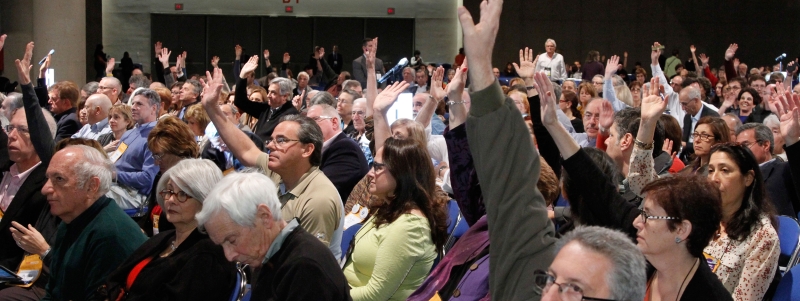Background
Drug and alcohol abuse continues to plague our society. We are deeply alarmed by the devastation such abuse causes the family and by the ever growing costs to society, not only monetary, but also in the loss of human resources.
The UAHC has established the Committee on Drug and Alcohol Abuse and has held two colloquia to explore the Reform Jewish response to this growing menace. The Committee is collecting data regarding the extent of substance abuse within the Jewish adult and youth community, treatment programs of special benefit to Jews, the housing of AA meetings at our won congregations, and substance abuse policy. As a result of the Committee's work, a National Substance Abuse Teach-In for the congregations is now an annual project. Colloquia research is forthcoming.
In 1971, the UAHC passed a resolution calling for drug abuse education, policy examination, legislation distinguishing classes of drugs and drug involvement, alternative treatment programs, and congregational programs.
In 1989, a subsequent resolution acknowledged alcohol abuse as a growing concern for the Jewish family, the subtle promotion of substance abuse in the media and entertainment area, and the need for programming in our religious schools.
As a result of our continued frustration, the 1989 resolution called for "the President and Congress to provide adequate funding for the government's anti-drug program to achieve its objective of cutting off the supply of cocaine and other illegal drugs."
Addressing the drug problem with primary emphasis on interdiction of the drug supply may require re-evaluation. Seventy percent (70%) of the thirteen billion dollars governmental expenditure for the "drug problem" is for interdiction and law enforcement. Thirty percent (30%) addresses prevention, education, and treatment. Obviously, substance abuse is being regarded more as a criminal problem rather than a medical/social problem — without much success.
THEREFORE, the Union of American Hebrew Congregations resolves to:
- Urge the CCAR and HUC to address substance abuse as an existing problem among Reform Jews and develop proper responses;
- Create programs and literature for dissemination to the congregations;
- Convent the Commission on Social Action and the Committee on Drug and Alcohol Abuse to jointly study and evaluate current governmental policy regarding drug abuse;
-
Urge member congregations to:
- Establish programming addressing teen and adult drug addiction;
- Introduce religious school educational programs for all levels, including the very young, geared toward developing personal responsibility for prevention of drug and alcohol abuse;
- Explore housing drug treatment programs such as Alcohol Or Narcotics Anonymous meetings at the synagogue;
- Examine their policies regarding the consumption of alcoholic beverages on synagogue premises;
-
Call upon the appropriate officers and bodies of the governments of the United States and Canada to:
- Reassess their priorities in combating drug abuse in the United States and Canada and in allocating resources emphasize prevention, education, and treatment rather than enforcement;
- Insure that any nationally developed health care coverage program sufficiently cover treatment for drug and alcohol abuse.
Give to the URJ
The Union for Reform Judaism leads the largest and most diverse Jewish movement in North America.
